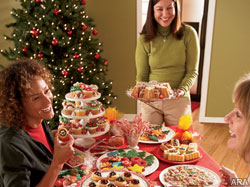(ARA) – The holidays are fast-approaching and chances are you’ll soon be receiving invitations to a cookie exchange or other requests for baked goods. While some people jump at the opportunity to bake, others are stymied by memories of previous unsuccessful attempts. Passing off the grocery store bakery cookies as your own again is always an option, but first, consider these simple tips for making homemade cookies you’ll be proud to share.
* Get organized. “Before anything else, read the recipe thoroughly so there are no unpleasant surprises when baking,” says Ginny Bean, publisher of Ginny’s catalog. Gather your ingredients before even turning on the stove to make sure that you haven’t forgotten anything that would require a trip to the store.
* Keep it simple. This is not the time to break out your grandmother’s famous cookie recipe with 27 ingredients. Bean recommends starting with this good, basic dough recipe and adding different ingredients to customize the taste and texture to personal preferences:
Ingredients:
1 cup (2 sticks) butter
3/4 cup granulated sugar
1/2 cup brown sugar
2 eggs
1 teaspoon vanilla
2 1/4 cups all-purpose flour
1 teaspoon baking soda
Directions:
Cream butter and sugars until fluffy. Add eggs and vanilla and beat until well mixed. In separate bowl, whisk flour and baking soda together, then add slowly to creamed mixture, beating until combined. Bake at 375 degrees for 10 minutes.
“There’s almost no end to what you can do to this dough,” says Bean. “Get creative and experiment with different mix-ins like lemon peel, pumpkin pie spice, even instant coffee, or substitute toffee or peppermint chips for traditional chocolate and butterscotch.”
* Use the right fat. Some cookie recipes only achieve their best flavor and texture with butter. Hopefully, those recipes will specify “butter only; no substitutes.” Recipes calling for butter or margarine will produce good results with either, as long as you use a margarine that contains at least 80 percent vegetable oil.
Check the nutrition label: The margarine should have 100 calories per tablespoon. Margarines with less than 80 percent vegetable oil have high water content and can result in tough cookies that spread excessively, stick to the pan, or don’t brown well.
* Measure accurately. Nested metal or plastic measuring cups are intended for dry ingredients such as flour and sugar. When measuring flour, stir it in the canister to lighten it and then gently spoon into a dry measuring cup and level the top with the straight edge of a knife.
Glass or plastic cups with spouts are meant only for liquids. If you use a liquid measuring cup for flour, you’re likely to get an extra tablespoon or more of flour per cup, enough to make cookies dry.
* Chill dough properly. The chilling time given in a recipe is the optimum time for easy rolling and shaping. If you need to speed up chilling, wrap the dough and place it in the freezer. Twenty minutes of chilling in the freezer is equal to about one hour in the refrigerator.
* Use a powerful mixer. An electric stand mixer is the best way to mix heavy cookie dough. With a handheld mixer, you’ll probably end up needing to stir in flour by hand, which can be a nightmare.
* Choose the right cookie sheets. Look for shiny, heavy-gauge cookie sheets with very low or no sides. Dark cookie sheets can cause cookie bottoms to overbrown, and cookies won’t bake evenly in a pan with an edge.
Insulated cookie sheets tend to yield pale cookies with soft centers. If you use them, don’t bake cookies long enough to brown on the bottom because the rest of the cookie may get too dry.
Nonstick cookie sheets let you skip the greasing step. But the dough may not spread as much, resulting in thicker, less crisp cookies. Unless specified otherwise, a light greasing with shortening or quick spray with nonstick spray coating is adequate for most recipes.
* Know your oven. Experiment with the temperature of your oven. If your oven typically cooks items faster than the recipe calls for, adjust accordingly. Don’t bake cookies for too long. They should be light brown around the edges and look a little underdone when they come out of the over. Keep in mind that cookies will continue to cook from the heat of the cookie sheet after you remove them from the oven.
Cool the cookies on the cookie sheet initially and then transfer them to a wire rack once they can be lifted with a spatula without breaking them. Once they are cooled completely, you can decorate them or store directly in an airtight container.
Ginny’s catalog is dedicated to showcasing fun and unique items for everyday life. The Holiday 2010 catalog includes more than 100 pages full of practical solutions for the kitchen, home and beyond, including housewares, appliances, furniture, accessories and lots of great gift ideas. You can also find seasonal recipes, including cookies, casseroles, stews and soups, and helpful tips on everything from turning Christmas cards into tree ornaments to making a popcorn garland at www.Ginnys.com.
To request a catalog or place an order, visit www.Ginnys.com or call (800) 693-0809.

